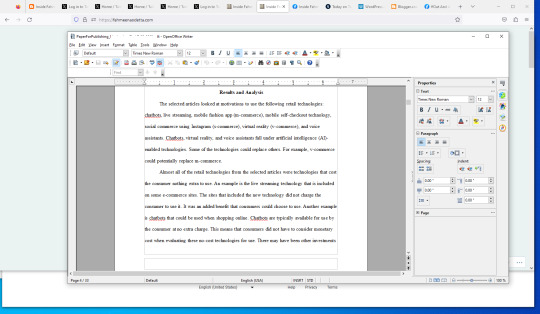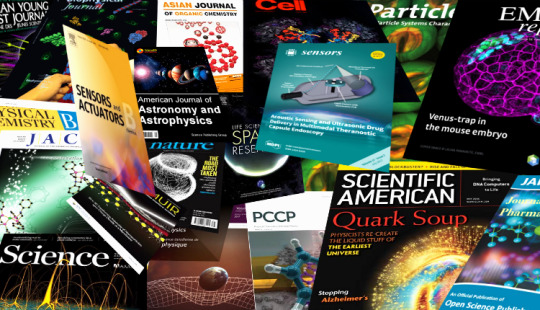#JournalSelection
Explore tagged Tumblr posts
Text
📚 Streamline Your Publication Journey with Journaleasy! Are you a researcher looking to publish your work but feeling overwhelmed by the process? 🤔 Journaleasy.com is here to help! Our comprehensive services include manuscript editing ✍️, journal selection 📖, and submission support 📤 tailored to your needs. Join the countless researchers who have successfully navigated their publication journey with our expert assistance. 🌟 Visit us today and take the first step toward sharing your research with the world! 🌍 #Journaleasy #PublicationSupport #Research
#Journaleasy#PublicationSupport#Research#AcademicPublishing#ManuscriptEditing#JournalSelection#SubmitYourWork#ResearchCommunity#PublishWithEase#AcademicSuccess#ScienceCommunication#ResearchMatters#ScholarlyPublishing#WriteAndPublish#ResearchersLife
0 notes
Text
Journal Selection
I thought I selected the right journal for one of the papers I submitted recently, but I guess I did not. I am still learning about the best journal for a paper, especially one of my interdisciplinary papers. The editor of the journal recommended another more specialized journal for the paper. He wrote: "Indeed, while the topic of this study is of potential interest, its overall contribution to the field appears too limited for the broad readership of the journal. Therefore, this manuscript would be better suited for a more specialized journal." I have never heard of the journal he recommended, but it does seem to be a better fit. It accepts APA 7th edition so no reference changes are needed (reference list changes as well as changes to in-text citations).

0 notes
Text
Academic Writing And Publishing
Mastering Academic Writing and Publishing: A Guide for Aspiring PhD Scholars Academic writing and publishing are critical skills for PhD scholars aiming to contribute to the body of knowledge in their field. Mastering these skills not only enhances your research credibility but also opens doors to collaborations, career advancements, and academic recognition. Here's a comprehensive guide to help you navigate the journey of academic writing and publishing effectively.
1. Understand the Purpose of Academic WritingAcademic writing serves to communicate complex ideas clearly and precisely to a scholarly audience. It requires a balance between depth and clarity, ensuring that your work is both insightful and accessible. Your goal is to inform, persuade, or contribute original findings to your discipline.
2. Developing a Strong Writing RoutineConsistency is key in academic writing. Set aside dedicated time daily or weekly to write, even if it’s just summarizing articles or drafting ideas. Use tools like mind maps or outlines to structure your thoughts before you begin.Pro TipSet SMART goals for your writing sessions: Specific, Measurable, Achievable, Relevant, and Time-bound. For instance, "Write 500 words for the introduction by Friday."
3. Crafting a Cohesive Manuscript
Title: Keep it concise yet informative.
Abstract: Summarize your research aim, methodology, findings, and implications in 250-300 words.
Introduction: Set the context, identify gaps in the literature, and state your research objectives.
Methodology: Clearly describe your research design, tools, and analysis methods.
Results: Present findings objectively, using tables, charts, or graphs.
Discussion: Interpret the results in light of the existing literature, highlight limitations, and suggest future research.References: Adhere to the formatting guidelines of your target journal.
4. Choosing the Right JournalSelecting the right journal is crucial for publishing success. Consider the following:Scope and Audience: Ensure the journal aligns with your research area.Impact Factor: Higher impact factor journals can boost your work's visibility.Publication Timelines: Some journals have faster review processes than others.Use tools like Journal Finder or Scopus to shortlist potential journals.
5. Navigating the Peer Review ProcessReceiving feedback from reviewers can be daunting but is invaluable for refining your work. Here’s how to handle it:Address Comments Methodically: Create a response letter addressing each comment with specific revisions or justifications.Stay Professional: Even if a reviewer’s tone seems harsh, respond respectfully.Be Persistent: Rejections are common; consider revising and submitting to another journal if necessary.
6. Common Pitfalls to AvoidPlagiarism: Always cite sources appropriately and use plagiarism-check tools like Turnitin or Grammarly.Overcomplicating Language: Write for clarity, avoiding unnecessary jargon.Neglecting Guidelines: Each journal has specific submission guidelines. Adhering to them demonstrates professionalism.
7. Staying Updated and ConnectedJoin academic writing workshops or webinars.Follow prominent researchers and publishers in your field on platforms like ResearchGate or LinkedIn.Collaborate with peers for feedback and co-authorship opportunities.
8. Leveraging Feedback from Mentors and PeersDon’t hesitate to share your drafts with colleagues or supervisors. Constructive feedback at the early stages can save time during journal submission.
9. The Reward of PerseveranceAcademic writing and publishing may seem challenging, but the rewards of seeing your work published are worth the effort. Every rejection, revision, and re-submission is a step closer to success.
Closing Thoughts As a PhD scholar, your research contributes to shaping the future of your discipline. Embrace the process of academic writing and publishing as a journey of growth and learning. Remember, every great scholar started where you are today—with determination and a vision to make a difference.Stay consistent, stay curious, and keep writing!
For more insights and resources, follow PhD Pioneers.
https://wa.me/919424229851/
1 note
·
View note
Text
youtube
#eSupportforResearch#researchsupport#UGC-CAREListGroupI#PublicationSupport#researchhub#Researchandpublication#researchhelp#RPE#CPE-RPE#webofscience#scopus#sci#esci#journalselection#Youtube
0 notes
Text
Choosing the Right Journal — A Comprehensive Guide for Early-career Researchers All the early researchers out there! Here is a customized blog for you on how to choose the right journal! A must-read blog if you are steeping into academia! Happy Reading!
1 note
·
View note
Photo

#Smiqgen, through its #journalselection services, helps in identifying the best #journal that suits your #research. We have vast experience in assisting #scholars and #researchers in #publishing papers and are aware of the guidelines and domain of some of the best #journals in your #domain.
See More
https://www.smiqgen.com/scientific-communication/journal-selection/
0 notes